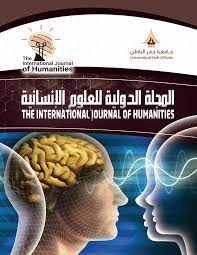Title
The International Journal of Humanities
The International Journal of Humanities accepts research, studies, articles, and original theoretical and applied research reports in the humanities (Islamic studies, social and psychological sciences, history, Arabic, and English), as well as receiving scientific research approved in scientific conferences connected with reputable scientific and academic institutions. The journal and the arbitrators then publish the work after editorial board approval.
ISSN: 1658-8789
ISSN: 1658-8789
Vision:
The journal should hold the top spot in the Arab world and compete globally with other scientific journals that publish themes and topics in the humanities.
Mission:
Adhere to the most recent technical systems that guarantee the journal’s workflow with excellent accuracy and speed, while also making sure to keep up with Arab and international standards in the scientific publication of original scientific issues related to the humanities. In addition, we continuously work to promote national research that advances the Kingdom’s 2030 vision for a more prosperous and productive society.
Objectives:
1. Approving and publishing humanities-related research that stands out for its uniqueness and novelty.
2. Working assiduously to provide the publication with an Arab and global influence factor and to be categorized in the Scopus and Web of Science databases.
3. Spreading knowledge in the humanities is important for the advancement of Arab society, therefore do your part to disseminate it there.
4. The exchange of scientific knowledge is ensured through scientific engagement with Arab and international peer-reviewed journals.
5. Supporting inventive and imaginative scientific research in the human sciences.
6. Spread humanistic knowledge and make it widely known in the Arab world to benefit the development of Arab society.
7. Publishing research from scientific conferences held by recognized scientific institutions after it has been examined for conformity with the publishing guidelines by the journal’s editorial board.
8. To monitor the most critical concerns and challenges, establish scientific communication with local institutions in the Kingdom. Encourage specialized researchers to conduct research and scientific study to address these difficulties.
The journal should hold the top spot in the Arab world and compete globally with other scientific journals that publish themes and topics in the humanities.
Mission:
Adhere to the most recent technical systems that guarantee the journal’s workflow with excellent accuracy and speed, while also making sure to keep up with Arab and international standards in the scientific publication of original scientific issues related to the humanities. In addition, we continuously work to promote national research that advances the Kingdom’s 2030 vision for a more prosperous and productive society.
Objectives:
1. Approving and publishing humanities-related research that stands out for its uniqueness and novelty.
2. Working assiduously to provide the publication with an Arab and global influence factor and to be categorized in the Scopus and Web of Science databases.
3. Spreading knowledge in the humanities is important for the advancement of Arab society, therefore do your part to disseminate it there.
4. The exchange of scientific knowledge is ensured through scientific engagement with Arab and international peer-reviewed journals.
5. Supporting inventive and imaginative scientific research in the human sciences.
6. Spread humanistic knowledge and make it widely known in the Arab world to benefit the development of Arab society.
7. Publishing research from scientific conferences held by recognized scientific institutions after it has been examined for conformity with the publishing guidelines by the journal’s editorial board.
8. To monitor the most critical concerns and challenges, establish scientific communication with local institutions in the Kingdom. Encourage specialized researchers to conduct research and scientific study to address these difficulties.
